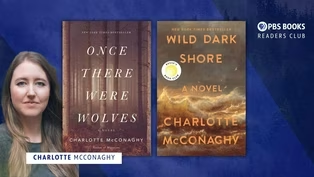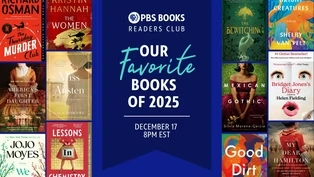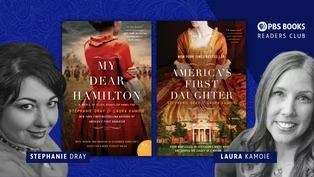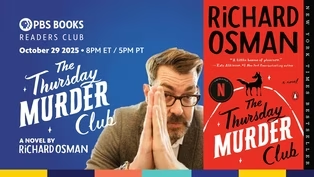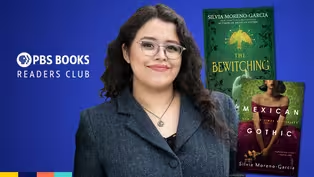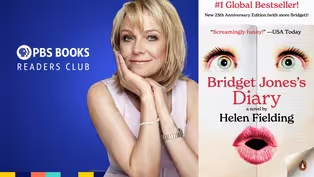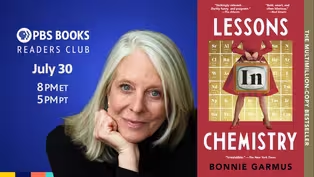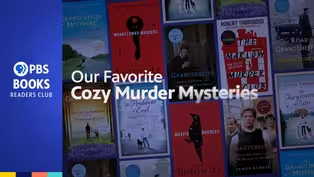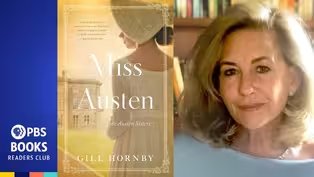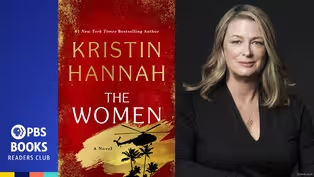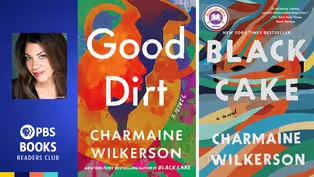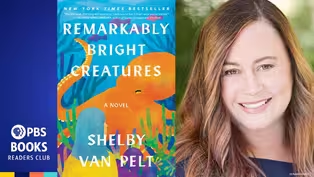
Readers Club | Ep. 205: We All Live Here | Jojo Moyes
Season 2025 Episode 27 | 57m 37sVideo has Closed Captions
PBS Books Readers Club welcomes international & New York Times best-selling author Jojo Moyes
PBS Books Readers Club welcomes international and New York Times best-selling author Jojo Moyes to discuss her brand-new novel We All Live Here. We All Live Here is a heartfelt, funny, messy family drama that is full of surprises. It’s a reminder that even the family we think we can’t forgive may have something to teach us about love.
Problems playing video? | Closed Captioning Feedback
Problems playing video? | Closed Captioning Feedback

Readers Club | Ep. 205: We All Live Here | Jojo Moyes
Season 2025 Episode 27 | 57m 37sVideo has Closed Captions
PBS Books Readers Club welcomes international and New York Times best-selling author Jojo Moyes to discuss her brand-new novel We All Live Here. We All Live Here is a heartfelt, funny, messy family drama that is full of surprises. It’s a reminder that even the family we think we can’t forgive may have something to teach us about love.
Problems playing video? | Closed Captioning Feedback
How to Watch PBS Books
PBS Books is available to stream on pbs.org and the free PBS App, available on iPhone, Apple TV, Android TV, Android smartphones, Amazon Fire TV, Amazon Fire Tablet, Roku, Samsung Smart TV, and Vizio.
Providing Support for PBS.org
Learn Moreabout PBS online sponsorshipMore from This Collection
The PBS Books Readers Club is a monthly digital-first series that brings its members into conversations behind the stories of your favorite books & shows. You can watch the online on the PBS App, with extended interviews available for PBS members on PBS Passport.
Readers Club | Ep 301: Charlotte McConaghy | Once There Were Wolves
Video has Closed Captions
PBS Books Readers Club hosts author Charlotte McConaghy to discuss her novel Once There Were Wolves. (58m 55s)
Readers Club | Ep. 212: Our Favorite Books of 2025
Video has Closed Captions
PBS Books Readers Club celebrates the wrap of its second season with a highlight of 2025 (47m 55s)
Readers Club | Ep. 211: America's First Daughter | Stephanie Dray & Laura Kamoie
Video has Closed Captions
PBS Books Readers Club welcomes co-authors Stephanie Dray and Laura Kamoie (1h 1m 45s)
Wed Oct 29 2025 | Readers Club | Ep. 210: Richard Osman | Thursday Murder Club
Video has Closed Captions
PBS Books Readers Club welcomes celebrity writer Richard Osman to discuss his best-selling novel (52m 44s)
Readers Club | Ep. 209: Silvia Moreno-Garcia | The Bewitching and Mexican Gothic
Video has Closed Captions
PBS Books Readers Club welcomes award winning author Silvia Moreno-Garcia to discuss her new book. (52m 42s)
Readers Club | Ep. 208: Helen Fielding | Bridget Jones's Diary
Video has Closed Captions
PBS Books Readers Club welcomes beloved British author Helen Fielding to discuss her iconic novel (59m 30s)
Readers Club | Ep. 207: Lessons in Chemistry | Bonnie Garmus
Video has Closed Captions
PBS Books Readers Club welcomes international best-selling author Bonnie Garmus to discuss her novel (49m 3s)
Readers Club | Ep. 206: Our Favorite Cozy Murder Mysteries
Video has Closed Captions
PBS Books Readers Club hosts a special event sharing Our Favorite Cozy Murder Mysteries (52m 32s)
Readers Club | Ep. 204: Miss Austen | Gill Hornby
Video has Closed Captions
PBS Books Readers Club welcomes international best-selling author Gill Hornby to discuss her novel (51m 18s)
Readers Club | Ep. 203: The Women by Kristin Hannah
Video has Closed Captions
PBS Books Readers Club welcomes international best-selling author, Kristin Hannah to discuss novel. (53m 29s)
PBS Books Readers Club | Ep. 202: Good Dirt & Black Cake | Charmaine Wilkerson
Video has Closed Captions
PBS Books Readers Club is delighted to welcome critically acclaimed author Charmaine Wilkerson (55m 29s)
PBS Books Readers Club | Episode 201 | Remarkably Bright Creatures | Shelby Van Pelt
Video has Closed Captions
PBS Books Readers Club launches season two with award-winning author Shelby Van Pelt. (57m 40s)
Providing Support for PBS.org
Learn Moreabout PBS online sponsorship(bright music) - The really interesting thing was, I had just queues and queues of women in that age group, saying, "I feel seen."
And I just realized there was this whole raft of women, holding up the sky, I call it, just kind of managing everybody, who just are invisible to everybody except each other.
(bright music) - Hey, and welcome to the PBS Books Readers Club.
- Today we welcome Jojo Moyes, author of New York Times bestsellers like, "Me Before you", and, "Giver of Stars."
She's here to discuss her delightful new book, "We All Live Here."
- Follow Lila Kennedy, a newly divorced mom who's dealing with her two wayward daughters, the recent loss of her mother, her grieving stepfather, who has silently moved in, and an old house that is falling apart.
- And if that isn't enough, her estranged dad who ran off to Hollywood 35 years ago, suddenly reappears.
Lila is struggling to juggle all of this, while also trying to write her new book, which somehow rides on being able to have some semblance of a love life.
- This messy but heartwarming novel, takes readers intimately through the struggles of a sandwich generation woman, who is overwhelmed trying to manage everything and everyone.
I suspect that many of you may be able to relate, and we encourage you to share your caregiving stories here in the chat.
It always seems to help when we come together around these shared struggles.
So, on that note, we've paired this month's book with a brand new PBS documentary, "Caregiving", by Executive Producer Bradley Cooper.
This important program will bring to light the challenges we face as family members, try to care for our loved ones, and for ourselves much like our heroine, Lila.
- Hi, I am Fred Nahhat, alongside Lauren Smith, joining us as always literary expert and award-winning writer, Princess Weekes, and our resident librarian and PBS books National Director, Heather-Marie Montilla.
- Now, before we dive into this book, we wanna hear from you, share your thoughts on, "We All Live Here", in the comments.
What did you think of this book?
Can you relate to Lila's sandwich generation struggles?
- I can definitely relate.
- I know you can.
(Weekes laughs) - If you can too, we sure hope to hear your stories in the chat.
And make sure to join the PBS Books Readers Club Facebook group to connect with other book enthusiasts.
You can share recommendations and stay involved in our ongoing discussions all month long.
- It's seriously, it's the best book club ever.
These folks, they give great recommendations, and they're so fun to talk to and connect with.
And don't forget, please share this event.
Friends, do not let friends miss out on great books, or author talks.
So, click share on Facebook or YouTube right now.
It helps us more than you know, we're so grateful for your support.
- Alright, so let's discuss Jojo Moyes' latest novel, "We All Live Here."
What'd you think?
- It's messy.
(panelists laughing) Let's start there.
She's got a lot going on Lila, as do many of us.
- Yeah.
And I feel like in so many cultures, that kind of multi-generational living arrangement is like very common, but it is very stressful.
And I think that, to tie in with caregiving, it is really hard to navigate taking care of someone, and managing their independence with like the real realities of what their health is now going to be.
And I felt like it really hit a lot of stuff that related to me and my personal life, with my own father and my own family, but also just like, it sucks getting older.
(Weekes laughs) Not because of the age, because of just how everything has to change, whether you like it or not, yeah.
- And I think, you know, hearing about her process and how she was dealing with her kids, or not having a space to write 'cause she's a writer, right?
Like, and having even that personal space to be able to, you know, think about relationships, relationships with people who are getting older, relationships from people who maybe were absent, and kind of the healing process in that.
And just, you know, always wanting to do the right thing as the leader of the household, but not always having the right answer.
- Yeah, and she's just under so much pressure from all ends, and she's on the caregiving side.
She's looking after her kids who are getting older, but she's also looking after her stepfather, and now her estranged father who she doesn't even want in her life is suddenly there.
And those questions about what do you owe your family members, just because they're family.
It's very complicated.
And I think the way that it was woven together in the book was really interesting.
- Well, within all the chaos, there's also this moment, that is kind of a moment of midlife renewal.
And she has goals, and she can see what she is going to achieve, if she continues to work toward it through all of this.
I'm not gonna attempt to mansplain that anymore, (panelists laughing) but I will stick with the fellas, which is the men, that's my area of expertise.
So, you've got Bill, tightly wound.
You've got Gene, unwound.
You've got Jensen who emerges as, I don't know, I guess the favorite.
Gabriel, I'm not sure there is any redeeming qualities there in the end.
But for Bill and for Gene in particular, they do find some redemption.
They do find some value, even though in the beginnings they're just an archetype, a stereotype of the very worst of us.
- Well, I think people are different, right?
And I think everybody has something to teach everybody else.
And I think that's part of what I took away from it, is all these people are flawed, but there's something that you could learn from them.
And I loved, like the Bill versus Gene drama, like the tightly wound stepfather that feels like, I've been there her whole life.
And then Gene was like, well, I'm her real dad, and I'm crazy.
And like, just the tension between those two.
And I just, I don't know.
It was very messy, but I thought it was great.
It's like the, Other Mamma Mia spinoff.
- It's like both the dad didn't get each other.
(panelists laughing) - I love that.
- Lots more to discuss with Jojo Moyes coming up.
She is standing by to join the conversation.
But first, let's talk about how you can join the conversation.
Sign up for our PBS books e-newsletter at pbsbooks.org/subscribe, for exclusive book recommendations, author interviews, and more.
- And did you know that our PBS Books YouTube channel, features hundreds of author interviews, and fascinating literary stories.
Geraldine Brooks, Percival Everett on his bestseller, "James", Kristin Hannah on, "The Women", Shelby Van Pelt, "On Remarkably Bright Creatures", the gang's all there on YouTube.
If you haven't already, subscribe and immerse yourself in a world of books and authors.
- And if you love these free PBS books author talks, consider supporting your local PBS station.
Now, more than ever, this program and your PBS station are counting on support from viewers just like you.
So please, if you can, visit pbsbooks.org/donate to make a gift.
- We are so grateful.
And that link, pbsbooks.org/donate, will take you right to your local station's giving page.
There among many other thank you gift options, you can support PBS Books directly, by selecting one of our special gifts.
This month, we're introducing a brand new gift, the PBS Books Readers Club book bag.
This stylish and sturdy tote, is perfect to carry around your books.
I'll be filling mine with plenty of books at my next library visit, that's for sure.
It's even got our logo, so you can show your support for public media.
We also have the official PBS Books Readers Club mug, just like what we have here on set.
On the back, it says, "My weekend is booked", and don't we know it?
- And the fun doesn't stop there, because PBS members also get access to PBS Passport, the member exclusive section on the free PBS app, where you can stream full seasons of incredible PBS shows, including masterpiece dramas, hours of concerts and performances, and well-crafted documentaries, like the new PBS documentary, "Caregiving."
- We are so grateful to everyone that has supported PBS Books so far.
It brings us great joy, to bring you closer to your favorite books and authors.
- [Fred] And now, let us welcome in our guest, author, Jojo Moyes.
Welcome to the PBS Books Readers Club.
Thank you so much for joining us.
- Oh, thank you so much for having me.
- Jojo, thank you so much for your book.
We're excited to dig in.
So, "We All Live Here", follows Lila Kennedy, who is in that ever so tricky stage of life where she's mothering older children while worrying about her aging parents, trying to manage her career, her home, her love life, and everything else.
What inspired you to tell this story?
- Obviously nothing to do with the fact that I'm roughly in that age group myself.
But actually, I started off just wanting to write a book about, a kind of, comedic dysfunctional family.
I usually write on a much bigger canvas.
I cover centuries, or geographical distance.
And I just, I've always wanted to write a small, kind of, family drama.
And then, the really interesting thing was, when I came to tour this book, I thought the talking point was going to be, the two old men who were always fighting.
- We do love that.
- Yeah, well I loved writing that, but the really interesting thing was, I had just queues and queues of women in that age group, saying, "I feel seen."
And, I just realized there was this whole raft of women, holding up the sky, I call it, just kind of managing everybody, who just are invisible to everybody except each other.
- Yeah, that's amazing.
I totally get that.
I feel seen.
- Yeah, that eldest daughter anxiety of like, I have to take care of everyone all the time?
It's madness.
And you, as you said, you've worked on big canvases and you've done so much research for other projects.
What was it like, crafting your brain around writing a smaller story that was intimate, like big emotions, big feelings, but dealing with that smaller canvas?
- Well, do you know, the scary thing was, it came so easily, that I kept losing confidence in the book, and thinking, well, this can't be any good.
'Cause normally, I would say three out of four books, it's like pulling teeth.
You are having to really struggle with the research, or the plotting, or just, you know, making sure everything's historically accurate.
And suddenly I was just kind of having fun with it.
That sounds terrible.
I felt guilty like in a weird British way, even for saying I had fun doing my job.
And I had to keep giving it to like, trusted readers and going, "Is this actually any good?
Because I'm really enjoying myself."
(Moyes and panelists laughing) And it was just it, I wrote it really quickly, and it just showed me the joy of like, (laughs) not boring yourself in research.
- There was quite a cast of characters, and they all had a storyline of personal growth.
How did you manage to balance all of them while writing?
Did any of them change from who you originally set out for them to be, to who they actually ended up being in the final version?
- Oh, that's such an interesting question.
No, I do a lot of work on character before I start a book.
So, I'm really sure of who they are.
I mean, I ask myself so many questions about them, how they grew up, what was their relationship with their parents?
You know, did they have siblings?
What do they want out of life?
All the way to, what's in the bottom of their fridge?
What would I find in their under-stairs cupboard, that might not be in anybody else's under-stairs cupboard.
You know, all those sorts of questions.
How would they react in a bar fight?
Because these questions tell you a surprising amount about your characters.
And you might not use it in the book, but it will tell you, whether they're arachnophobic, and, or whether they are likely to freak out if somebody has an argument.
All those things that make it interesting when the characters meet each other.
So no, they didn't respond differently.
But I will tell you that, Gene nearly ran away with the book.
- Yeah, listen, I would agree with that.
It's, amid the mess, all the chaos, all of the challenges, each character is being propelled toward some redemption, either a second, or third act.
Of course, Gene included.
What was it like to write this novel?
What was your process to make sure all of these characters, and their destiny was pulled through?
- Well, I always have an idea of where I'm gonna end up.
I knew I wanted a redemption at the end.
I just knew I didn't want it to come via a conventional means.
I mean, I don't wanna give away the twist of the book, but one of the things I loved writing about, was the fact that the older people in this book, the gentleman in their seventies and, a mother, who is no longer living when the book starts, but we see one chapter through her viewpoint.
In her sixties, she was making an almighty mess of her life.
And what I loved writing about was, the fact that we can gain years, but still have no clue, what we're doing in the realm of love.
I think that's one of the things that surprised me more and more as I'd got older, and I've looked around me at my friends, and members of my family, and we're all just kind of flailing around, trying to get it right.
So yeah, that was a fun thing to explore.
But I am a plotter.
I have a friend, Lisa Jewell, who writes amazing psychological thrillers who you probably know, and she doesn't plot at all.
Like she sees where her brain takes her.
And every time we talk about it, my toes curl up in my shoes.
(panelists laughing) I cannot cope with that idea at all.
Even if my characters deviate, introduces unexpected things, I have to have a rough idea of both where, I and the plot are going.
- That's so interesting.
And we are all just kids inside of these grownup bodies, right?
Sometimes it just gets worse, like an old man kid is.
That's how I describe Gene.
- I spend my adult money on my childhood, in delight, honestly.
(panelists laughing) - Let's talk about Lila for a second.
She struggles to write her novel.
She's constantly finding excuses and ways to avoid it.
And then, when she's finally sitting at the computer, she's not able to get the words out.
Was that purely fictional?
Did some of that reflect your own experiences as a writer?
- [Weekes] So relatable.
(panelists laughing) - Yeah, actually no, I'm really, kind of disappointingly focused.
I really- From the day I got my first book deal, which was three books later, that I'd written, that nobody wanted.
I was so grateful to be given the chance to write books, that, I was like a machine.
I just let, okay, I'm at my desk, here we go.
And interestingly, I've done an interview with a neuroscientist, a creative coach, who talks about the fact that, sorry, a little bit of brain science is probably unexpected.
But she said that 10 years in journalism, and writing the three books that didn't get published, strengthened my neural pathways that tell my brain when I sit at a desk, it's writing time.
So, what happens is that, with most people, they kind of think about writing, and they'll sit down, and then they'll think about their sock drawing needs rearranging, or there's 18 other very interesting things that they need to do.
My neural pathways, especially now since I've written another, I don't know, 17 books on top of those three unwanted ones, they have what's called a myelin sheath.
An actual physical structure, that stops them getting washed away.
So, I find it, I shouldn't say this, I'm touching the wood of my desk.
I find it relatively easy to sit down and write, because, I literally have a brain structure that now says, sit down, you're at a desk, it's time to work.
Lila isn't that person, but I was really interested with Lila in the idea of nonfiction, which is something I've never written.
Because she's one of these people, and you see them everywhere from social media to, I don't know, newspaper columns, who write really intimate stuff about their own life.
And I found it fascinating, 'cause it makes me go a bit wobbly and cold.
I couldn't do it if you paid me a million bucks.
(panelists laughing) - I agree.
- And I just was fascinated by the way that if you write about yourself, you really make yourself a hostage to fortune.
Because, once that curtain's drawn, you can't close it again, and your whole life is out there.
So, I guess that's what I was trying to explore with that storyline.
- Oh, that's really interesting.
I need to work on some of those brain pathways.
- I was gonna say, can I get a plastic surgery for that?
(panelists laughing) Like I don't- My face can look whatever, but if I can get my brain to do that, I would pay every ounce.
(panelists laughing) - If ever I'm trying to write, I have all my great ideas when I'm not writing.
Walking around, laying in bed, I go to write, they're gone.
- Yeah.
- The classic (indistinct) - Oh yeah, you've gotta have the notes up on your phone.
You've gotta put that stuff down.
'Cause you always think you're gonna remember it, and then it always disappears.
- Absolutely.
Well, since you don't suffer from (laughs) writer's block, but you did mention that Gene was a voice that really, kind of, came to the surface.
Were there any moments where you were kind of, struggling to maintain Lila's voice throughout the novel with all of these other characters coming in, and like, taking up space?
How did you hold onto her as the central figure in the story?
- I found over the years that, again, for me, every book is most dependent on character.
If I have an absolutely crystal clear view of what that character's voice is, it becomes very easy for me to just inhabit one, then inhabit another.
I never had a question of what Lila's voice would be.
(indistinct) that's a whole another matter.
But I think all writers have different strengths, and for me, the real focus is character, because I find I can read something that's really beautifully written, or something that has an extraordinary plot, but if I don't care enough about the character, I'm gonna forget that book when I finished.
And the books that I really love are the ones that I kind of wanna kick myself when I finish that I didn't write those characters, because they were so memorable.
Yeah, those are the ones that I really love.
- I'm just curious if you- I'm trying to envision how that actually works.
So, you're sitting down and you're starting a book.
Do you actually take like a few days, and like write out what your characters are like?
Like how does that actually play out in your process?
- Oh, months.
- Months, okay.
- Months.
Yeah, I'm kind of marinating them for a long time before I actually get to the business of writing.
And yes, I've got kind of whole notebooks, where, I'll write down a bit of dialogue that they might say, or I'll write down a little scene that I can picture them in.
And, some of these I'll use, some of them I won't, but they become kind of coat hangers for me to hang these characters on.
And so, by the time I actually get to writing, I'm probably not gonna use 95% of the information that I've built up around them.
I'll have a rough visual picture.
But mostly, it's funny, I was talking to another writer about this not long ago.
I don't have very strong visual images of my characters apart from, Gene, funny enough, he was a very clear visual character.
But I do have a really strong sense of their internal lives.
Like, Gene is a giant man baby.
You know, you said something similar a moment ago, which made me laugh, because he's basically an ego on legs.
He's every older actor that I've ever- (everyone laughing) We're gonna get in trouble.
But, he's just one of these people that's never really had to grow up, and it could make him the worst possible dad.
And he is objectively a bad dad.
But what I love is, that thing with a character where, we all assume we know what goes on in each other's heads.
Human beings are incredibly confident that we can tell ourselves stories about what other people are thinking and feeling.
And there's a really fascinating book by Will Storr, called "Story", which proves that actually we're mostly really wrong.
And that's something I try and keep in my mind all the time, especially if I'm being judgy about somebody, or kind of, you know, taking a dislike.
I just think, what is the story I'm telling myself?
And what I was trying to do with these characters, was show that the people who they show up as, initially, with Gene, with Celie, Lila's daughter, often, when we have to put ourselves in their shoes, we see the world through a very, very different prism.
And then, we tend to have a little bit more sympathy and understanding for them as well.
- Alright, well I would love to see Gene's notebook.
I would like to read your (panelists laughing) character notebook for him.
It'd be very interesting.
- Yeah, I think if you just put the words giant man baby- (panelists laughing) - That's all we need to know.
- May I just offer a rebuttal on behalf of all men?
- Yes, please.
(Jojo laughs) - So yes, like, part of being- more mansplaining coming up, part of being a man is, you don't want to be like Gene.
You don't necessarily want to be like Bill, you wanna find the happy medium.
But I'll say this, as soon as the chips are down, Gene has a superpower, and he is able to be the right voice, at the right time, to solve all kinds of problems.
Most of which, I will also say, the school drop-off conceit, we've all done it either as kids, parents, I hope to do it one day as a grandparent, that is rife with dialogue and dramatic possibilities.
- Oh yeah, I don't talk to anybody.
I wear my sunglasses, I wear my hat.
You're like a celebrity.
(panelists laughing) You're like, I can't- - It is a thing, it's a thing.
- [Heather] I completely agree.
- I'm comforted to hear it's the same over there.
I thought it was just me.
- No, you're not alone.
- You're not alone.
I actually thought it was brilliant that you included that, because I know it is a point of stress for a lot of women to go pick up their kid at the schoolyard, because of all of the drama, you know?
And especially if you've gone through a divorce or gone through some drama recently or trauma personally, it's very complex.
So, as we speak about characters, I'd love to hear a little bit more about Lila's relationships and friendships, and how they play.
Really, they do play this pivotal role in your story.
Can you tell us more about how writing the relationships that are intertwined, how it influenced the plot, and Lila's personal growth throughout the book?
- Okay.
Well it's really important to me, and I've done this in the last three to four books that I've written, to show women supporting other women, because I think in entertainment, maybe not so much in books, but definitely in TV and film, for a long time there was this kind of, weird unspoken trope that if two women were on screen, they generally had to be in competition with each other.
And the thing that I found the older I've got, is that your friends become increasingly important to you, and increasingly a support to you.
And so, it was really important for me to show that, Lila had truth tellers, somebody who had known her for a long time, who could call her out when she was behaving stupidly, but who was absolutely a source of love and humor, and someone she could be kind of goofy with.
Because, the big surprise to me at the ripe old age of 55 is that, frankly, I'm still an infant.
I have zero dignity.
(panelists laughing) I'm waiting for this kind of, grownup version of myself to arrive, and it hasn't happened.
And I'm starting to realize it may never happen.
And I kind of like that in my female friends.
I love the fact that we can kind of fool around laughing like we were 12.
And I wanted to show, women of this age, kind of having fun, as well as, dealing with the serious stuff.
- If I could try to sum up Lila's life in one word, it would be pressure.
Pressure to succeed at work, be a good mother, be appealing to her romantic interest.
Is this pressure something that you've experienced, or seen others experience in your life?
And how did that play out in your writing?
- I have never not felt that pressure.
I don't know any women who don't feel it.
And if you do know them, can you point them out?
(panelists laughing) - Well, there's none here, I don't think.
(panelists laughing) - But are you those guys?
- Absolutely.
- Okay, I would just- I would love to know how to let it all bounce off me.
there are a lot more women carrying the emotional load at this age, while trying to maintain all these things.
Like the realization that it's going on, it's just what you're expected to do from the youngest of ages.
And, I think one of the things that probably prompted the writing of this book was, and it sounds kind of crazy, but I took up a hobby.
I took up the hobby of classical dressage, which is really niche.
It's basically, kind of prancing around on a horseback, doing teeny-tiny movements, and trying to get it technically right.
And I realized, this is the first time, since I've been a child, that I do something that has no value, whatsoever, to anybody except me.
It costs me a bunch of money.
It doesn't- Everything else that I do, I realized- A therapist just asked me the question, "What do you do for you?"
And I said, "I walk my dog."
And she went, "No, that's walking a dog, (panelists laughing) that's not for you.
Enjoy it, but it's not for you."
I said, "I do Pilates."
She went, "No, Pilates is to strengthen your terrible writer's back and to stay fit.
That's not for you.
What do you do, that's just for you?"
And I've asked so many women this question since, and none of them can answer.
I mean, I could ask you guys now, what do you do for you?
- Yeah, all I can think of is like, exercise related things.
(Lauren laughs) No, you're right, it doesn't count.
- I read a lot of fan fiction, that is purely for me.
(panelists laughing) But even that, it's like, especially like when you are a writer, you end up trying to like, photosynthesis almost everything to consume.
So it's, even when you're like trying to read for pleasure, it somehow it'll come up in what you do.
So it's, even with that, when you're a creative person, or even just someone who takes a lot of information, it's just like hard to turn that off.
Maybe dressage, I gotta get into that.
(panelists laughing) - I dunno, (indistinct) it's humbling.
- I was just gonna say when I go to a museum, I do that for me.
But I think- - Oh, lovely.
Sometimes it doesn't just become about me, because I have kids in tow.
But I am doing it for me.
- Oh no, no, no, no, that doesn't count.
(panelists laughing) - It's good for the world.
- You (indistinct) (panelists laughing) - Well let me say, I have a marriage of 30 years, where someone's been handling all the emotional load.
If I try to get my wife to do something for herself, it takes some convincing.
- Well it's good that you try to get her to do it, 'cause it does take some convincing, 'cause you feel guilty about it.
- Yes, you do.
- Yes.
And I think it's, I mean, the fact that you encourage your wife to do it, did you say you were married 30 years?
- 30 plus, yeah.
- That's why.
(panelists laughing) - Yeah, no, it's all a conversation.
- I like that she's interviewing us.
- I know.
(panelists laughing) - [Weekes] Back and forth, no, I Love it.
- Let me ask about a couple other characters.
Jensen.
- Okay.
- And Gabriel, I'm not sure there's anything redemptive about Gabriel in the end.
Although, your expectation as you meet the characters, one, seems erudite, and considered, and more of a dateable prospect.
Whereas Jensen seems to be roughly hewned, and just, you know, a little bit slower in pace.
Talk about that little switcher, that's pretty awesome.
- Yeah, I will tell you, I don't tend to write intimate scenes.
I've tended to steer away from them.
And partly it was because I used to live in a small village, and you can do all the research in the world, you can write about horseback librarians in Kentucky in the 1930s.
You can write about war brides in the 1940s.
And nobody will think anything other than you've spent a lot of time studying military history, or, you know, (indistinct) I can tell you, if you write a sex scene, everybody in your school playground will look at you like, we know what you do.
(Lauren laughs) - Yeah, that makes pick up and drop off a whole other thing.
(Lauren laughs) - Yeah.
The whole time my kids were growing up, I just didn't do them.
And then I thought, well, this book is kind of about a woman reclaiming that side of herself.
So, I had, there were two intimate scenes in this book, and one of them is with Gabriel, as you say.
And I can tell you, that I was so physically uncomfortable writing that scene.
Nothing terrible happens, I should make that clear.
Well, nothing overtly terrible.
It's just, there's a, let's say a gap between what Lila perceives is happening, and what is actually happening.
But just, writing about it, and then also having her, as a character go through that, I have never before in writing a book, literally just wanted to kind of crawl into a fetal position and then go and scrub my brain out afterwards (Lauren laughs) that I did with that scene.
He is not, I don't wanna say too much, but he is not what she thinks he is.
But I did enjoy writing Jensen, who, I don't know, again, if British men are very different from American men, but there is a certain type of British man, who quite likes pulling your pigtails, so to speak, who will just keep kind of being annoying and jokey.
And I think, yeah, it's a possibly less romantic, and more jokingly combative relationship, than a lot of people might be used to.
But, most English women will have dated that guy, at some point, and we don't necessarily mind it.
It's quite funny.
(Lauren laughs) - Okay Jojo, I'm going to invite you to humble brag for just a moment, because you've written a number of bestsellers, including "Giver of Stars", "Me Before You", and many others.
What is it about these stories that you think people connect to?
- Oh, you know, if I knew, I would've started doing that a lot earlier, and hopefully with three books living under my bed.
But, I think people can see themselves in the characters.
I think, the thing that really surprised me when "Me Before You" came out, which, you know, was not expected to be a hit by, you know, considering my publishing history, and also considering the subject matter, because it was essentially about assisted suicide.
But, people who had been through similar situations, I.e.
being in a caring role, or not knowing what they wanted to do with their life, or just loving someone who maybe didn't wanna be loved.
People just seemed to see themselves in a very universal way.
And the thing that astonished me about the success of that book, was, audiences reacted in the same way.
Whether they were in America, Brazil, South Korea, Japan, everybody had the same feelings.
And it really gave me, a kind of lovely sense that, essentially, yes, we're all very different in a lot of ways, but we all struggle with the same things.
There are so many things, that uniter, across the globe.
And that book really showed it to me.
So, I think it's just the humanity and the characters.
- As you think about universal themes, how do you feel your writing has evolved over the years?
- I hope it's evolved.
I think the big switch for me, the pivot, came with "Me Before You", which was the first book and that was book number nine, that I'd used humor.
Because it was potentially such a difficult topic.
I knew that I needed to leaven the sad stuff with, something funny.
And, it's like that thing about the emergency services, you know, the people who deal with the worst possible things have all the best jokes, like they're some of the funniest people you can hang out with.
'Cause they just learned that you have to balance, you know, both those things together.
And, so every book that I've written since, has contained a good dollop of humor.
Sorry, I dunno if that's a very British word.
(panelists laughing) I try to make people laugh, at least as much as I make them cry.
- We appreciate that.
This book is really funny.
I think you said that you were laughing out loud the whole time.
We appreciated the humor- - Oh thank you.
- in this one.
- Absolutely.
- I'm curious, I'm always curious about the beginning of a writer's career, Because, becoming a bestselling author, having your book adapted into a huge movie, it seems like just, it's like a fantasy.
It's like becoming a rock star, winning an Oscar.
Was there a moment with some of your early work that you felt like, oh my gosh, like this is the moment this could actually be happening?
- No.
(panelists laughing) - Well, it's happened, is it now?
- I was unsuccessful for a long time before I was successful.
And I, you know, I wrote these three books I told you about that nobody wanted, and then number four got picked up, and I was so excited.
I was like, this is it.
Now I'm gonna be a published author, and it meant so much.
And it kind of did okay, nothing special, but everyone was hopeful for the next one.
And then, what I found was for the next 10 years, I would write a book kind of every year to 18 months, and it would kind of just about do okay, but, never quite lived up to the early promise.
And I could sense that my publishers were losing confidence as they had every right to, because I just wasn't setting any charts alight.
I wasn't, I mean, I wasn't setting them alight, I wasn't getting anywhere near them.
And, you know, supermarkets who were a major force in book selling over here wouldn't stalk me, because I hadn't done well at the last time out.
And we as a family were, we were living on a farm, and we built an extension, so that we could let out a room.
Because, I felt that we weren't gonna, I didn't have a career left in publishing.
And then I came up with this idea for, "Me Before You", I switched publishers, to a publisher, Penguin, Michael Joseph, Pamela Dorman books in the US, who really believed in me.
And, everything from that moment shifted.
And then the film came out, and I had no idea up to that point, the impact that having a movie has on your publishing sales.
And so, I went from probably selling, I don't know, I think I would've been lucky to sell 500,000 over my first eight books.
And then, from number nine onwards, I've sold some, I think something like 57 million.
- What kept you going, through those, like those first few books?
- I think I'm really stubborn.
(panelists laughing) I don't- Do you know, I look back and I think, I have no idea how I did it, because I had a full-time job, I was working on a newspaper, which is not a kind of, you know, relaxing job.
And I had a baby, and I was going home, putting the baby to bed, and then writing.
And now I look back and I think, my goodness, you know, I'm asleep on a couch drooling at nine o'clock most nights, (panelists laughing) how did I do it?
But I think I'm just one of these people that I'm gonna keep trying something, unless you give me a really good reason why I shouldn't.
And nobody gave me a good reason why I should, so I just kept going.
- We've heard you talk about, crises of confidence and circumstance along the way.
But going all the way back to the beginning, was there a moment, that you knew that you had the creativity, the imagination, the ability to string a sentence and two together, and the athleticism, the fortitude, to complete what's really a marathon in writing a novel?
Was there a moment you knew you would be a writer?
- No.
I don't, I didn't know any writers growing up.
Like my parents were both artists, so we knew artists, but I didn't know anybody who wrote books.
So, it didn't feel like a kind of valid career choice to me.
I thought writers were people who lived in Paris in a garret and wore big black glasses, and polar necks, you know?
And then, I went to work for, "The Independent" newspaper, and I worked there for 10 years, and, there was a woman who worked quite nearby me in a desk, and her name was Helen Fielding.
And one of the editors came around, and said he would really like somebody to write a column written from the viewpoint of a young woman.
And she wrote it, and it turned into "Bridget Jones's".
And I think that, there was something about seeing somebody near me, achieve that, that kind of gave me the idea that, well, if I work hard enough, and I kind of really work on my writing, why can't I do that?
She was just an ordinary person like me, obviously a prodigiously talented ordinary person.
She was somebody who was in my eye line.
You know, I guess that, that was the thing I could see, somebody else managing to do it.
So, I think this stubborn thing was just, just keep doing it.
And I'll be honest with you, it was only after "Me Before You", that I felt confident about having readers.
Because, if you write eight books and nobody really reads them, you do start questioning yourself.
You think, well, maybe I just don't write the kind of things that people want.
Maybe I'm just missing something, I'm just born in the wrong era, or I'm just not doing it right.
And the loveliest thing about success, is that, I have gained these readers and not just any readers, but people who will come along for the ride, for each book.
And then they come and meet me at signings, and they tell me things and you know, we chat, and it's like, I have really friendly readers as well.
Like, you know, I have friends who write thrillers, who get kind of slightly, shuffly people.
(panelists laughing) I get really smiley people, who come up and feel like we know each other.
And it's such a lovely thing because, when you've done eight books with very few readers, I can tell you, it really gives you a lot of confidence and happiness to then write another nine or whatever it is, that bring you a lot of readers, and I definitely prefer the latter.
- Aw, we've only just met, I feel like, I'm so happy for you.
It's so great.
what is the most challenging part of being an author and what's the most fun?
- Ooh, good question.
Two challenging things, I guess.
One is the first 30,000 words of any book, at which point I'm never sure if it's gonna work.
Like, you've marinated an idea, you've come up with your characters, you think you know how it's gonna go, and then sometimes I get to 30,000 words, and it's suddenly too like something I've already written, or it just isn't coming alive on the page.
And you are the only person that can sort that out.
It's not like, you can sit in your office, and chat to one of your coworkers and say, "Can you help me with this?"
Although I have had asked other writers for help in the past, or I have sent them things.
I remember sending Jody Picoult 20,000 words of my last book, "Someone Else's Shoes", at a point when I had the closest thing I'd ever had to writer's block.
But to be fair, it was during COVID, and everything was weird.
And she read it overnight, and just sent me back a message saying, "I wanna read more about this book, get on with it," kind of thing.
in an inimitable style.
And, when you have another writer who you admire, tell you, no, this is good, keep going, it gives you a lot of confidence.
So that, I would say is the hardest thing.
But the best thing, honestly, I love meeting readers, I really do.
I never get tired of it because, 'cause I didn't have them for so long.
And I love it when, you realize that, you sit on your own in a room, for nine-tenths of your writing life, and you forget that these things actually might have resonance on the other end of the line.
And then someone will sit down and tell you how, this has meant something to them, because A, B or C has happened to them, or this made them laugh, or this got them back into reading at a point when they just didn't wanna read anything anymore.
Or this stopped them thinking about a sad thing in their life.
And it feels like an immense privilege.
You know, you get to touch people's lives in a way, that also allows you to retain your anonymity.
Like, I never wanted to be a famous person.
I can't imagine the awfulness of having your face, you know, known.
I'm just a name on a spine.
I can guarantee you that I walk down any street, and nobody has a clue who I am.
And so, to be able to touch people's lives, and at the same time, not have to deal with any of the, kind of downsides of that feels fantastic.
- Congratulations, it's very well earned.
- So, our viewers, of course your readers, are always interested in how you do what you do.
What is your ideal writing setup?
Are you a morning person, late into the night?
Do you play music?
Do you work at home, coffee shop?
Like, what's the deal with when you're putting it down?
- Okay.
I'll give you my ideal writing day, and I'll just add the fact that it happens about twice a month.
I have an office around the corner that I walk to.
I have a coffee machine there.
My ideal writing day would start at about 8:00 AM, and probably finish at about three.
But that very rarely happens.
I do listen to music.
I have very different soundtracks for any book that I write.
And the weird thing is, as long as it has no lyrics, I can listen to it again, and again, and again.
And what that does, it helps me maintain the tone of whatever I'm writing.
At the moment, I'm writing a book that's set in Italy, and I'm listening to a singer called Roberto Murolo, who was big in the 1940s.
And the reason I can for once listen to some lyrics is because, they're an Italian.
So, I've got no clue what he's saying.
But it just helps the mood, it helps maintain the mood, 'cause often, books can shift in tone in a way that isn't useful.
And, yeah, the best days are when you just sit down, and you know where you're going, and you've got your plot roughly in your head, and it feels like you're channeling the words.
You're not, kind of, having to drag them out.
You're just, it's coming down here and then out through your fingertips.
And that also happens about twice a week.
(panelists laughing) - We all need to get in the zone sometimes.
Have you read any books that you've really loved lately?
We'd love to hear about any of your recent favorite reads.
- Oh, I read a book recently.
I was feeling a bit down, and a friend of mine said, I said I wanna read something cheerful, and she said, this book is completely charming.
And it's called, "The Wedding People", by Alison Espach.
- Yeah!
- That's my favorite.
- And I was so cross at the end of it that I didn't write it, which is always a sign of a really good book.
It's just got such a brilliant concept, and I won't tell you it if you haven't read it, but it made me feel better about life in general.
It was beautifully written and I absolutely loved it.
I actually wrote to her to tell her as well, 'cause (indistinct) of their stuff.
- So, think back to young Jojo.
Were there any books from your childhood that really resonated with you, and sort of spurred that love of reading and literature?
- Yeah.
And one of my favorites is an American classic and it's called "The Black Stallion" by Walter Farley.
And it was made into a film by Francis Ford Coppola much later, but I think it originated in the kind of 1950s, and is just about a young boy who gets shipwrecked on a desert island with a wild black stallion, and how they take care of each other until, he ends up back in America, and brings this horse with him.
And you don't have to love horses to love this book.
It is just a fantastic story about resourcefulness.
And, I think as a kind of weedy child, I just loved reading about kids who achieved something despite being small, and kind of relatively powerless.
And, yeah, I've read that book again and again, and my kids used to complain that I made them watch the film so much.
(panelists laughing) But it's just a great adventure story.
- It's a really funny one.
- I love that.
I maybe I'll read that to Wilson, he likes- - Wilson would like that.
- Yeah, he'd be into that, yeah.
- What is the best advice you've ever received?
- Keep going.
Just keep going.
With writing, I always say that my career is a hymn to persistence.
I, you know, there were so many occasions where I could have just ducked out and given up, and I'm now reaping the benefits of never having done that.
And I tried to say to my kids, you know, you are gonna meet obstacles in whatever career path you meet, and in life in general.
And really it's not about, how many obstacles you receive, it's just how you choose to frame them, and how you choose to get past them.
And so, so much of life is dependent on your level of resilience.
And so, I'm grateful to my parents for kind of imbuing some of that in me.
But yeah, it applies to life where it applies to writing.
I don't quite know why I carried on writing after three rejections, but I'm so glad I did.
- So are we.
(panelists laughing) - Yeah, it's good advice.
- Well, I mean, you may disagree with the premise, but to me, there's writers and then there's authors.
And the authors have put all that work into it.
And I'm sure you could put a masterclass together, on how to go from a writer to an author, and be so accomplished.
But if you had to boil it down to one thing, one sentence, one bumper sticker, what advice would you give to aspiring writers?
- Read.
I'm sorry if that's really boring, but, I meet so many people who say they want to write, and I say, "Oh, what do you like reading?"
And they say, "Well, I haven't really got much time to read."
And I think, well, how can you learn what is good, and what what is, you know, and none of us have any time to read.
None of us have any time to write.
You have to kind of carve that time out.
So yeah, I guess it would be rude, but also protect your time, because none of us have time to do anything, and you have to just be, really rigorous about carving out 500 words a day, or reading 500 words a day, either will do.
- That is great advice.
I remember we talked to Julia Alvarez about her book, "Cemetery of Untold Stories" and that was her advice too.
I remember her, she was, "Read, read, read."
- Yes.
(Heather laughs) - Such great advice.
- Jojo, what do you hope that readers will take away from your books?
- Oh, it varies with every one.
Primarily, I just hope they'll be entertained, and I hope it will have given them a little holiday in their head from whatever is going on in their own lives.
But, with this book, I felt like it was, a kind of plea for understanding, because what this book is about essentially is forgiveness.
It's about Lila trying not to repeat the patterns of the past, in her own life.
And to do that, she has to get let go of a lot of stuff.
And I, you know, I'm in at an age where, I've had to think about that for myself.
You know, we all reach a point in our lives where we go, well, am I gonna keep blaming so and so for something, or my parents or, you know, or am I gonna kind of move on, and just try and do so with Grace?
And so, it's about the fact that, everybody is carrying something that we know nothing about, but also, it's about just perhaps relieving yourself of the burden of bitterness.
You know, just letting stuff go, and trying to move forward with grace.
- That's so adult.
- That's beautiful.
- Yeah, very grown up.
(panelists laughing) - I'm not that evolved.
I don't know why I'm trying to sound like that.
(panelists laughing) - It's in there somewhere.
(Lauren laughs) - It's in there somewhere, yeah.
- Finally, Jojo, anything you'd like to say to your readers?
- Thank you.
Thank you for sticking with me.
Because, I write really different books every time.
You know, "The Giver of Stars", was a big departure from the one before, and, this is a lot more comedic than other books.
And somehow, there's this lovely group of people that will forgive me, the kind of, the slight variations, and just stay with me for the story.
So, I'm really grateful that people keep giving me the chance to, not write the same thing every time, because it keeps it really interesting for me.
And, I never stop being grateful, basically, I'm really grateful that they're still with me.
So, thank you readers.
- And Jojo, we are grateful to you for joining us.
Thank you so much for talking to us on the PBS Books Readers Club.
We appreciate it.
It has been a delight.
- Oh, thank you so much.
It's been such a pleasure speaking to you all, thank you.
- Thank you.
- So good.
- Well that was just wonderful.
She was fantastic.
- The tenacity, like, having gone through that much, a hymn to perseverance, as her career was so powerful.
Like, you always hear the stories of people like their debut, they knock it off and they go forward.
But to really grind, and really fight and claw for your art, for your work, and them to have this happen, it's just, it's so, it's so moving, it's a reminder to never give up.
And I think, every single author that we talk to, elevates their work whenever they speak, and this was no exception, just a really great conversation.
- I agree.
I think she might be my favorite stubborn person.
(panelists laughing) She was like, I'm a stubborn person, and I'm like, I normally don't get along with stubborn people, but I liked her, I really liked her.
And I think her work of art, I like how her works are so different, and so complex, and the character development, how she explained all of her work in developing her characters, it's really amazing.
- Yeah, she is.
I mean the confidence that you have to have, to get through three books that don't get picked up, and then a number of other books that do get picked up but don't do well, and still know that you have it and keep going, I think that's remarkable.
And I do love that she has, her books are also different.
She doesn't have like a template, that she's rewriting again and again.
It's really interesting.
- So interesting.
And we started out with the word, messy, and I think that grew into the word, complicated, as far as the story goes, the relationships, all of that.
And, just the philosophy that she shares as a writer, I mean, she's inseparable from her work.
And toward the end of our conversation, we began with a, if someone's disappointed you, give them a chance to surprise you, I love that thought.
But I think what a lot of our viewers and at least for me, really gets value out of, is the more personal, the philosophical, the viewpoint of these authors that are able to create this art that moves us.
But you know, it's coming from a real person, in real time, and I love every minute of it.
- Well, I'm curious especially with both of you, because I know you're both in situations where you are taking care of family members, that this book must have hit a little bit differently for you.
- It was emotional, and if anything, I felt this kind of sense of like, I need to do more.
You know, because I don't have children, I don't have those outside responsibilities and I think, because I don't have that, I feel like, then I need to do more, like, that I don't give credit to that kind of emotional labor, but the reality is like, I'm lucky for every day I get to spend time with that person and also to be able to help the other people around me who need help.
Like sometimes it is just a phone call, checking in.
My dad loves a McDonald's fish sandwich, so I send him a McDonald's fish sandwich.
(panelists laughing) - Well, that's the point.
I mean, in these situations, as anything in life, a lot of times intellectual persuasion, or logic is not the route to convincing some moment, or coming up with a solution.
It's emotional, it's raw, it's speaking, you know, to the heart.
And you know, he is sort of a parody of Star Trek, but it everything Star Trek, it's like your business model's very logical captain, but it's the heart, Spock, it's the heart.
This is all heart, it's all heart.
And that's where it starts, that's where it ends.
- Well, thank you both for sharing a little bit about your personal stories, and thank you book friends for joining us for such a wonderful discussion.
Stick around for just a moment to find out what we're reading next month.
But first we invite you to join the celebration of reading by supporting this program, and your local PBS station at pbsbooks.org/donate.
- Please give what you can, because your support helps keep this program going on for another month.
If you're watching on Facebook or YouTube, just click the link in the description or comments, or visit pbsbooks.org/donate.
You'll be taken to your local PBS stations donation page, where you can find PBS books swag, as our thanks for your donation.
- [Lauren] One of the gifts you can receive is the special edition book bag.
Carry around your favorite books, and more in this stylish and sturdy tote, and sport your love for PBS books.
Or you can get the official PBS Books mug.
It says, it's got the logo on the front on the back, "My weekend is booked!"
I know that's true for you, just as it is for all of us here.
- Now, in this episode, we talked a lot about caregiving, and both the struggles and the joys that many of us share, in caring for our family members.
If you wanna dig deep into this topic, I invite you to check out our watcha like, "Caregiving" by executive producer Bradley Cooper.
The film centers on the challenges and the triumphs, that caregivers, both professional and familial, face each day.
These personal stories, including Cooper's own experience caring for his father, are interwoven with the broader context of the cultural, and economic conditions in the US, leading to a care system, tipping into crisis.
"Caregiving" will air on PBS in June, but you can catch it now on the PBS app.
Remember that as a member of your PBS station, you'll gain access to member exclusive content on the app, with PBS Passport, including, caregiving and other documentaries, full seasons of "Masterpiece", and your other favorite PBS shows.
- Now, you may be wondering about next month's pick.
We've got a special treat for you, Heather, would you like to tell us more?
- I would love to.
Next month we're diving into cozy murder mysteries, with a special episode highlighting genre favorites, like "Moonflower Murders", "Magpie Murders", "The Marlow Murder Club", and more.
- [Lauren] A lot of M names in these times.
- A lot of M's.
(panelists laughing) - Merry murdering.
And many of these cozy mysteries have been adapted for the PBS screen.
For over 50 years, "Masterpiece" has been the home of the best mysteries, and dramas on TV, including the iconic, "Masterpiece" mystery series, which adapts classic crime novels, and creates engaging series for today's audience.
- These lighthearted crime stories focus on amateur sleuths in tight-knit communities, solving puzzles, and sniffing out murderer, as while still managing to feel comforting and somehow cozy.
- [Fred] We're bringing some of your favorite authors and filmmakers together for one unforgettable episode, so make sure you RSVP, to our Cozy Murder Mystery Special on Facebook, right now.
- So, get ready with us by dropping your favorite cozy mystery novel in the comments now, and share recommendations for your fellow book clubbers to dig into.
- [Weekes] And we'll share even more book recommendations, when you sign up for the PBS Books e-newsletter at pbsbooks.org/subscribe.
- [Heather] And be sure to subscribe to our YouTube channel for past episodes and hundreds of author talks, - [Fred] And we'll see you next time.
Thank you for being part of the PBS Books Readers Club.
(bright music) (bright music continues)
Support for PBS provided by:
